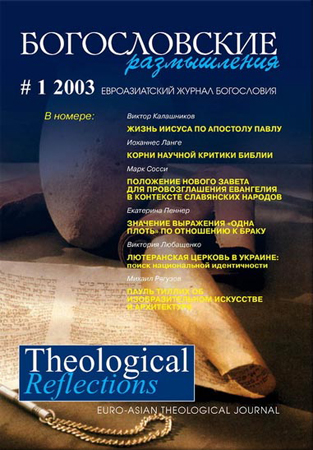The Roots of Scientific Bible Criticism
Keywords:
Scientific Bible Criticism, historical-critical interpretation, exegetical practice, method of exegesis of the Holy ScripturesAbstract
This article shows that scientific criticism of the Bible is a particular way of thinking that is founded on methodological doubt, inherited from Rene Descartes’ philosophical concept, and is applied to historical-critical interpretation of the Bible by means of three principles: criticism, analogy, and correlation (E.Troeltsch). The exegetical practice that results from this concept is characterized by such elements as methodological atheism; the assessment of the Bible as a product of human thinking; the assumption of evolutionary development of thought; and the separation of truth and reality. In the second part of the article this approach is evaluated in the light of the object of interpretation itself: the Bible. The author concludes that historical-critical interpretation, in its roots and in its essential elements, contradicts its object of research, the Bible itself, and therefore cannot serve as an acceptable method of exegesis of the Holy Scriptures.References
- Conzelmann, Hans. Grundriß der Theologie des Neuen Testaments. München: Christian Kaiser, 1976.
- Conzelmann, Hans and Andreas Lindemann. Arbeitsbuch zum Neuen Testament. 7th ed. rev. and enl. Tuebingen: J.C.B. Mohr (Paul Siebeck).1983.
- Goppelt, Leonhard. Theologie des Neuen Testaments, 3rd ed. by Juergen Roloff. Goettingen: Vandenhoeck & Ruprecht. 1981.
- Ernst, Jenni. „Jhwh Jahwe.“ In Theologisches Handwоеrterbuch zum Alten Testament, Volume I, ed. Ernst Jenni and Claus Westermann. Munich: Christian Kaiser, 1971.
- Kaldewey, J. „Die Geschichte der synoptischen Tradition von Rudolf Bultmann und das Problem des ‚historischen Jesus.‘“ Bibel und Gemeinde 78 (1978).
- Kuemmel, Werner Georg. Einleitung in das Neue Testament. 21st ed. rev. and enl. Heidelberg: Quelle und Meyer. 1983.
- Maier, Gerhard. Biblische Hermeneutik. Wuppertal: Brockhaus. 1990.
- Menge, Hermannn, ed. Langenscheidts Großwоеrterbuch Griechisch Deutsch. 27nd ed. Berlin: Langenscheidt. 1987.
- Riesner, Ranier. Jesus als Lehrer. Eine Untersuchung zum Ursprung der Evangelien-Ueberlieferung. 2nd ed. Wissenschaftliche Untersuchungen zum Neuen Testament Series 2/7. Tuebingen: J.C.B. Mohr. 1984.
- Schlink, Edmund. Оеkumenische Dogmatik. Gоеttingen: Vandenhoeck & Ruprecht. 1983.
- Schmitt, Werner H. Alttestamentlicher Glaube in seiner Geschichte. Neukirchen-Vluyn: Neukirchener Verlag. 1979.
- Stadelmann, Helge. „Die Entstehung der Synoptischen Evangelien. Eine Auseinandersetzung mit der formgeschichtlichen Synoptikerkritik.“ Bibel und Gemeinde, 77. 1977.
- Stuhlmacher, Peter. Vom Verstehen des Neuen Testaments: Eine Hermeneutik. Neues Testament Deutsch, Vol. 6. Gоеttingen: Vandenhoeck & Ruprecht. 1979.
- Troeltsch, Ernst. „Ueber historische und dogmatische Methode in der Theologie.“ In Theologie als Wissenschaft. Aufsаеtze und Thesen. Theologische Buecherei Volume 43. ed. Gerhard Sauter. Munich: Christian Kaiser. 1971.
Downloads
How to Cite
Issue
Section
License
Copyright (c) 2020 Johannes LANGE

This work is licensed under a Creative Commons Attribution-NonCommercial 4.0 International License.
All articles published in the Journal are distributed under a Creative Commons Attribution-NonCommercial 4.0 International License
By submitting an article for publication in Theological Reflections: Eastern European Journal of Theology the author grants the editors the right to publish the article and distribute it in electronic and print form.
The author reserves all copyrights and the right to use the materials of the article in whole or in part for educational purposes, to write his own dissertations, to prepare abstracts, conference reports, oral presentations, etc., as well as post electronic copies of articles (including the final electronic version downloaded from the journal’s official website) on non-commercial web-resources without the consent of the editorial board and founders.



